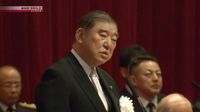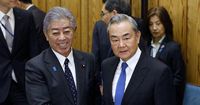Tokyo, Japan — In a significant diplomatic move, Japan and China engaged in their first high-level economic dialogue in six years on March 22, 2025, seeking to rekindle cooperation amidst ongoing tensions. This meeting in Tokyo was co-chaired by Japanese Foreign Minister Takeshi Iwaya and Chinese diplomat Wang Yi, marking the first visit to Japan by a Chinese foreign minister since November 2020. This endeavor aims to address critical issues at play, notably China's blanket ban on Japanese seafood imports, which was implemented following the release of treated radioactive water from the Fukushima nuclear power plant.
The backdrop of this dialogue is significant. Relations between these two economic powers have been strained by various disputes, including China's military escalations in the region. A separate meeting between Iwaya and Wang earlier in the day addressed the broader spectrum of bilateral relations, aiming to stabilize ties that have seen increasing friction in recent years.
China's ban on Japanese seafood imports was put in place in August 2023, coinciding with Japan's decision to discharge treated radioactive water from Fukushima into the Pacific Ocean—a move that raised alarm from Beijing over potential impacts on human health and the environment. In September 2024, Japan and China tentatively agreed to gradually resume trade in Japanese marine products, contingent upon China's commitment to adhere to international monitoring standards set by the International Atomic Energy Agency (IAEA).
During the recent dialogue, officials anticipated that discussions would cover not only seafood imports but also Japan's ongoing requests for the resumption of beef imports from China, which have been curtailed since 2001. The last critical advance on this front came after the previous high-level economic meeting in April 2019, which led to a quarantine agreement signed in November of that year. Following that pact, import bans on Japanese beef were lifted; however, subsequent discussions have made little headway due to the pandemic and other diplomatic hurdles.
Iwaya emphasized Japan's commitment to maintaining the safety of its citizens abroad—a concern that has heightened following recent incidents, including the fatal stabbing of a schoolboy in Shenzhen last September, allegedly by a Chinese national, and the subsequent detentions of Japanese nationals on espionage allegations. Such incidents have fueled fears within Japan regarding the security of its people in China.
Alongside these economic discussions, security concerns are also paramount. The Senkaku Islands, a group of uninhabited islets in the East China Sea, have become another flashpoint in Japan-China relations. These islands are controlled by Tokyo but claimed by Beijing, and tensions have flared due to repeated incursions by Chinese vessels into Japanese territorial waters surrounding these islands.
As China and Japan embark on this critical dialogue, the path forward remains laden with challenges. Both nations are poised to address sensitive topics, with the mutual hope that dialogue will pave the way for greater stability and cooperation in the future. Managing the intricate web of historical grievances and contemporary security concerns will be vital as they work toward enhancing bilateral trust.
In summary, while this meeting aims to break a six-year hiatus in high-level talks, the complexities of Japan-China relations are far from resolved. The outcome of discussions held on March 22, 2025, will undoubtedly influence future interactions and economic collaborations between the two nations, as they navigate the tumultuous waters of geopolitical rivalry and mutual dependency.





